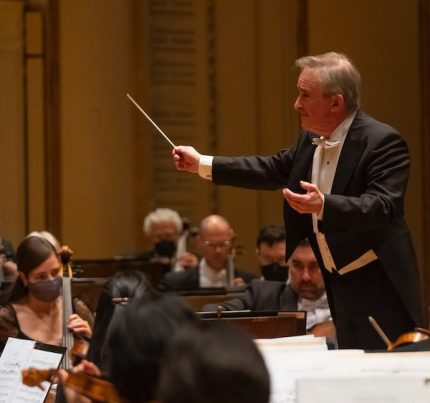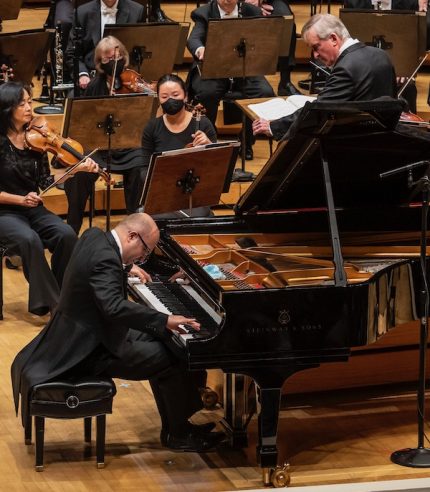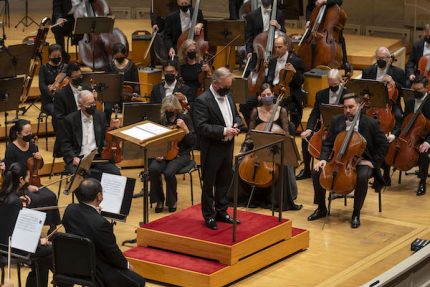Conlon and CSO excel in Russian music, honor Haitink

Thursday night’s Chicago Symphony Orchestra concert opened with a somber announcement from guest conductor James Conlon: hours before the show, Bernard Haitink had died at the age of 92. The storied Dutch conductor led the CSO during the interregnum between the Barenboim and Muti eras from 2006-2010.
Conlon offered brief, personal remarks honoring the man’s spirit and artistic integrity. The CSO strings opened the evening by performing Bach’s “Air on the G String” (the second movement of the Orchestra Suite No. 3 in D Major) as a tribute to their former principal conductor. Conlon led an effective rendering with an apt atmosphere of somber warmth.
Conlon himself was standing in for Michael Tilson Thomas, who was forced to withdraw from two weeks of CSO concerts this month while he recovers from surgery for a brain tumor.
Interestingly, the first scheduled work on the semi-revised program could hardly have been more funereal: Shostakovich’s Chamber Symphony for Strings in C Minor, an arrangement of the composer’s String Quartet No. 8 by Rudolf Barshai (approved by the composer).
The original Quartet No. 8 was written after a trip Shostakovich took to Dresden in 1960, when the city was still recovering from the devastation wrought on it in the Second World War. Shostakovich even thought of the work as his own requiem, suggesting at one point it could be dedicated “to the memory of the composer of this quartet.”
Conlon led a performance that captured the Chamber Symphony’s bleakness and desolation. Robert Chen’s wandering violin solo in the opening Largo conveyed utter isolation, as did his feeble, whisper-soft sustained pitches amid bomb-like chords from the full strings in the fourth movement, where an exquisite, vulnerable high cello solo from Kenneth Olsen provided the sole glimmer in an otherwise barren landscape. The CSO strings spitefully spat out the Allegro molto, and the cackling Allegretto sounded suitably macabre. The concluding Largo was almost affectless in its expression, like there was nothing left to say or feel.
Pianist Alexander Gavrylyuk was centerstage for Prokofiev’s compact Piano Concerto No. 1 in D-flat Major, Op. 10. The composer himself played the U. S. premiere of this work with the CSO on his first trip to Chicago in 1918. (Three years later, he and the Orchestra would also give the world premiere of his Third Piano Concerto, which will be heard next week.) At that time the country was at the height of the Spanish Flu, though only two weeks of concerts were cancelled, and Prokofiev’s debut went ahead as scheduled.

Prokofiev clearly made quite an impression in those performances, though it is hard to imagine him and the orchestra doing much better than Gavrylyuk and company on Thursday night. The remarkable opening statements had broad sweep, and Gavrylyuk took the solo part at a breakneck clip without ever losing the inimitably playful quality of Prokofiev’s writing.
The evocative Andante assai was cinematic in the best sense of this word, and the Ukrainian-born pianist was commanding in the final Allegro scherzando, booming out a quasi-cadenza. Conlon was an assertive but unobtrusive leader who kept the complex score on the rails. The concerto dates from 1912, and it was hard not to be amazed at the sheer ingenuity the teenaged Prokofiev packed into this 15-minute opus, to which Thursday’s performance did ample justice.
The program concluded with another work from a teenager, Schubert’s Symphony No. 3 in D Major, written when the great lieder composer was just 18.
Thursday’s performance proved a less successful venture than the Russian fare, perhaps unfairly leaving little mystery as to why Schubert’s later symphonic ventures are better known. The performance made Schubert’s debt to Haydn apparent, particularly in its stately opening Adagio maestoso, though never rose above the routine. The coy Allegretto felt particularly charmless.
John Bruce Yeh provided characterful clarinet solos throughout; assistant principal oboe Michael Henoch’s pale timbre and dubious intonation repeatedly undermined section polish in woodwind passages. One could hear hints of the sprawling finale to the Ninth Symphony in the perpetual motion of the closing Vivace, but this was not enough to compensate for an otherwise pro forma Schubert outing.
The program will be repeated 8 p.m. Friday and Saturday. cso.org

Posted in Performances




